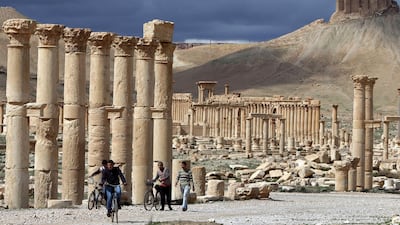I’m an antiquities geek. I love archival research, looking at letters and manuscripts from bygone centuries; I get a thrill from walking up an ancient staircase and seeing the grooves in the stone created by the thousands, maybe millions, of feet that have preceded mine.
There is a version of this same thrill when I walk through the galleries of Louvre Abu Dhabi: I notice the sculptor’s chisel marks on the stone figures and the worn pages of the religious books – indications of the human presence in the objects, a reminder that our present moment exists only because of what has come before.
In Istanbul, where I spent last weekend, the ancient world is inescapable. You are meandering through a neighbourhood of hipster shops and record stores, only to turn a corner and bump into a 14th century stone tower or an ancient cemetery. I came to Istanbul in search of a ghost: Lady Hester Stanhope, who fled a life of impoverished aristocracy and spinsterhood in England and arrived in Istanbul in 1811.
Lady Hester spent several years in what was then Constantinople, learning Turkish and tracking Napoleon’s movements in Europe through her network of spies. Her interest in geopolitics emerged while she served as hostess for her uncle, William Pitt the Younger, the two-time British prime minister.
From her time with Pitt, she knew many of the important men in Europe and “the Orient”. She told a friend that she wished she had been born a man so she could be a general. Her political involvement did not deter the commander of the Turkish navy, however, who let it be known that he wanted Lady Hester for his harem.
Having no intention of becoming an odalisque to the Pasha, Lady Hester left for Egypt. She knew people who refused the Pasha had a way of disappearing. Her admiration for Constantinople and the power of the Ottomans did not extend to their mode of governance. From her years with Pitt, she knew that a healthy state allowed dissent, even discord, lessons she learned as she watched him voted out of office and then voted back in three years later.
_______________
Read more from Deborah Lindsay Williams:
There are some occasions when development doesn't feel like advancement
We don’t need more women on pedestals; we need more men who know how to behave
The unsettling beauty of the Markazi exhibition and the questions it prompts
_______________
As a hostess for the prime minister, Lady Hester felt the weight of public opinion. Everything she did became fodder for gossip. In Turkey, however, she found freedom. She straddled horses, wore the flowing robes of a Turkish noble and mixed freely. She never returned to England but her unorthodox lifestyle and her habit of voicing inconvenient opinions made her notorious. She was dismissed as a crackpot, an hysterical woman, opinions that completely overlooked her accomplishments as an explorer.
Lady Hester assembled an expedition led by Bedouin (with whom she communicated in Arabic) to Palmyra in the Syrian desert, making her the first European woman to see Zenobia’s kingdom. She led the first archaeological dig in the Holy Land, in Ashkelon (what is now southern Israel), where she uncovered a marble statue but ordered it to be destroyed so she would not be tainted with the reputation of being an archaeological thief like ordered smashed the only artefact they found as a way to distinguish herself from Lord Thomas Elgin, who had taken the Parthenon Marbles from Athens a decade earlier.
Lady Hester’s fascination with Palmyra and Istanbul demonstrates that she too drew inspiration from antiquity and the women who preceded her, such as Zenobia, the queen of Palmyra, who attempted to resist the Roman army and Hurrem Sultan, known as Roxelana, the beloved wife of Ottoman sultan Suleiman the Magnificent, who became one of the most powerful figures in the Ottoman empire.
Virginia Woolf famously described the power of social constraints on women's lives in A Room of One's Own, in which she imagines what would have happened to Shakespeare's sister, had he had one. Judith Shakespeare, in Woolf's imagining, ends up dead, her prodigious literary talents unrecognised.
Lady Hester’s story, however, provides a counterpoint to Judith Shakespeare’s. Her story resists the typical narratives of limitation and confinement and reminds us to comb the margins of history for so-called “crackpots” and “crazy ladies”. What were those women doing? Leading expeditions? Writing books? Plotting the paths of the stars?
Lord George Byron, the English Romantic poet, said Lady Hester was “that dangerous thing, a female wit”. Her danger-loving wits took her to unexpected places, with remarkable consequences; I am sure, however, that she was not alone. Are there similar explorers among the Bedouin who roamed the Arabian peninsula centuries ago, waiting for us to discover and celebrate their stories?
Deborah Lindsay Williams is a professor of literature at NYU Abu Dhabi

